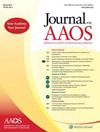How Do We Improve Sleep Quality After Total Joint Arthroplasty? A Systematic Review of Randomized Controlled Trials.
IF 2.6
2区 医学
Q1 ORTHOPEDICS
Journal of the American Academy of Orthopaedic Surgeons
Pub Date : 2024-09-10
DOI:10.5435/jaaos-d-24-00548
引用次数: 0
Abstract
BACKGROUND Despite the importance of sleep for physiological function, rehabilitation, and recovery, sleep quality after total joint arthroplasty (TJA) remains poor. The objective of this systematic review was to identify, summarize, and evaluate postoperative interventions aimed at improving sleep quality after TJA. METHODS A systematic review of PubMed (MEDLINE) and Scopus (Embase, MEDLINE, COMPENDEX) from inception to April 2024 was conducted (PROSPERO ID: CRD42023447317). Randomized controlled trials on interventions to improve sleep quality were included. Sleep outcomes, including the Epworth Sleepiness Scale, Pittsburgh Sleep Quality Index, Patient-Reported Outcome Measurement Information System-Sleep Disturbance, Numeric Rating Scale sleep scores,l9 were extracted. Descriptive statistics were used to analyze the available data. RESULTS Of the 1,549 articles identified, seven randomized trials with a total of 840 patients were included (394 total hip arthroplasties [THA], 446 total knee arthroplasties [TKA]). Pittsburgh Sleep Quality Index was the most commonly used outcome for assessing sleep quality. Among THA studies, zolpidem, combined fascia iliaca compartment block (FICB) and dexmedetomidine (DEX), and perioperative methylprednisolone were shown to markedly improve postoperative sleep quality. Neither topical cannabidiol nor topical essential oil was found to improve postoperative sleep quality after TKA. Melatonin had no effect on sleep outcomes after TJA. CONCLUSION Zolpidem, FICB + DEX, and perioperative methylprednisolone are effective interventions to improve sleep quality after THA. Topical cannabis, topical essential oil, and melatonin did not improve sleep quality. No effective sleep interventions for TKA patients were identified. Improving sleep quality remains a potential therapeutic goal to improve patient satisfaction after TJA. Continued investigation on this topic is therefore necessary.如何改善全关节置换术后的睡眠质量?随机对照试验的系统回顾。
背景尽管睡眠对生理功能、康复和恢复非常重要,但全关节置换术(TJA)后的睡眠质量仍然很差。方法对 PubMed(MEDLINE)和 Scopus(Embase、MEDLINE、COMPENDEX)从开始到 2024 年 4 月的数据进行了系统回顾(PROSPERO ID:CRD42023447317)。研究纳入了有关改善睡眠质量干预措施的随机对照试验。研究人员提取了睡眠结果,包括埃普沃思嗜睡量表、匹兹堡睡眠质量指数、患者报告结果测量信息系统-睡眠紊乱、数值评级量表睡眠评分l9。结果 在确定的 1549 篇文章中,共纳入了 7 项随机试验,共计 840 名患者(394 例全髋关节置换术 [THA],446 例全膝关节置换术 [TKA])。匹兹堡睡眠质量指数是最常用的睡眠质量评估结果。在 THA 研究中,唑吡坦、联合髂筋膜室阻滞 (FICB) 和右美托咪定 (DEX) 以及围手术期甲基强的松龙均可明显改善术后睡眠质量。外用大麻二酚或外用精油均不能改善 TKA 术后的睡眠质量。结论唑吡坦、FICB + DEX 和围手术期甲基强的松龙是改善 THA 术后睡眠质量的有效干预措施。外用大麻、外用精油和褪黑素不能改善睡眠质量。目前尚未发现针对 TKA 患者的有效睡眠干预措施。改善睡眠质量仍是提高 TJA 术后患者满意度的潜在治疗目标。因此,有必要继续研究这一课题。
本文章由计算机程序翻译,如有差异,请以英文原文为准。
求助全文
约1分钟内获得全文
求助全文
来源期刊
CiteScore
6.10
自引率
6.20%
发文量
529
审稿时长
4-8 weeks
期刊介绍:
The Journal of the American Academy of Orthopaedic Surgeons was established in the fall of 1993 by the Academy in response to its membership’s demand for a clinical review journal. Two issues were published the first year, followed by six issues yearly from 1994 through 2004. In September 2005, JAAOS began publishing monthly issues.
Each issue includes richly illustrated peer-reviewed articles focused on clinical diagnosis and management. Special features in each issue provide commentary on developments in pharmacotherapeutics, materials and techniques, and computer applications.

 求助内容:
求助内容: 应助结果提醒方式:
应助结果提醒方式:


